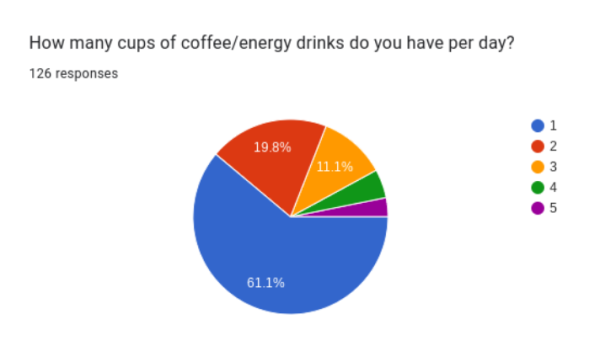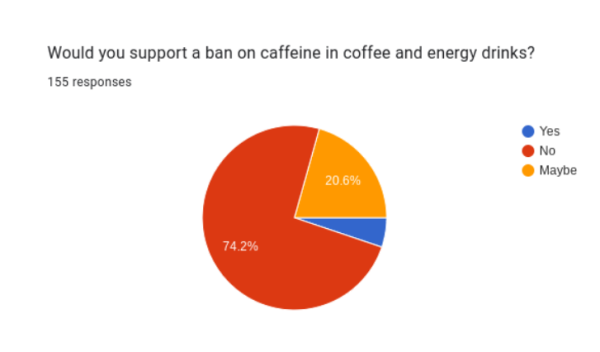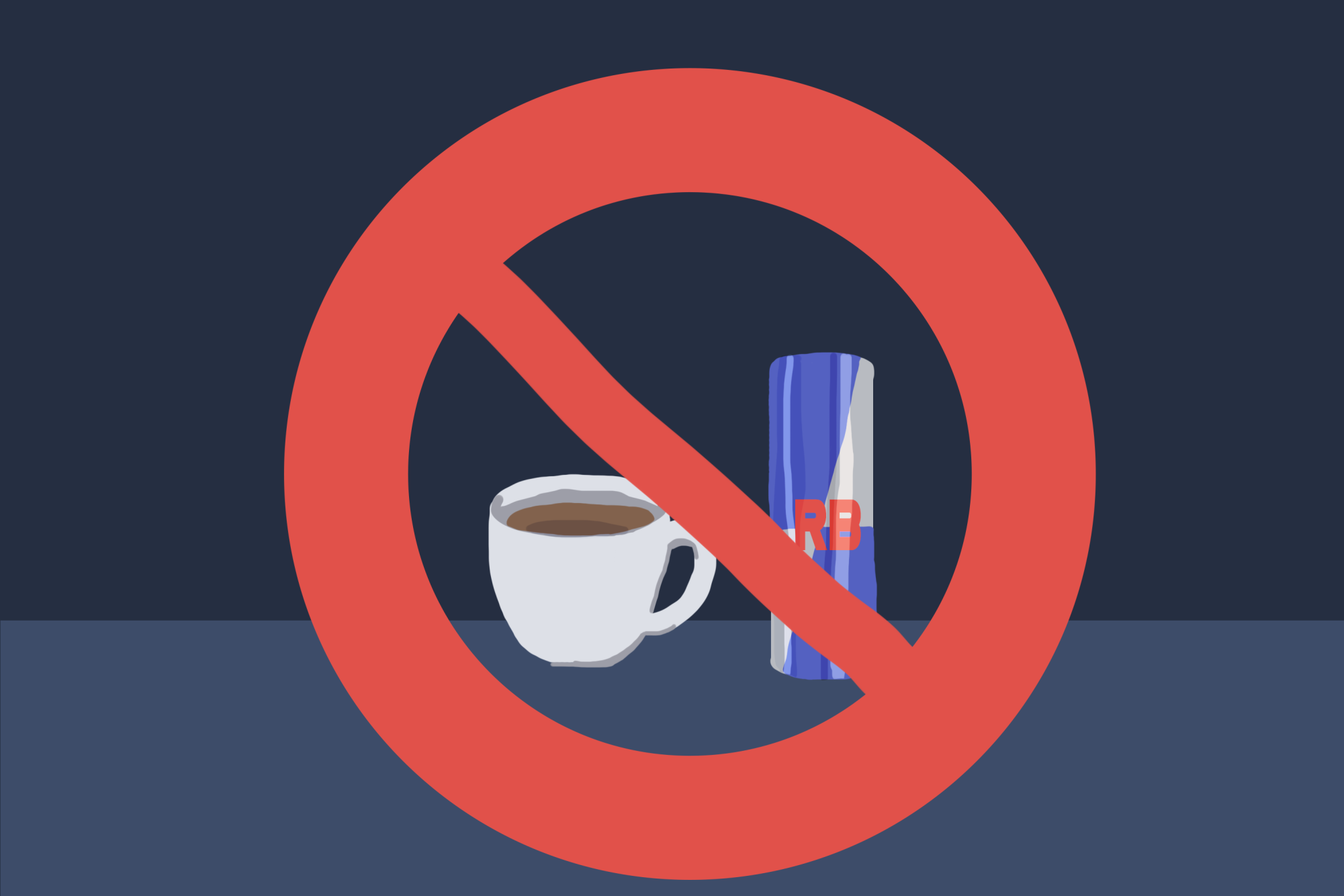Picture a world where your morning cup of coffee is contraband, where energy drinks are outlawed, and where soda is a forbidden pleasure. This may sound crazy, but when you truly think about it, it’s the way things should be.
“I felt terrible and almost died! Caffeine is a drug and your body can be really thrown off, almost even shut down,” exclaimed a family friend who wishes to remain anonymous.
When you look at the impacts of excessive caffeine on health, productivity, and societal norms, a true argument emerges for treating caffeine like other controlled substances.
“Having too much caffeine elevated my blood pressure and heart rate to almost have a heart attack. I viewed 4-5 Red Bulls daily as my keep-going for 12-15 hour days, now I stay away from them entirely,” the family friend explained further.
In the last decade, the global consumption of caffeine has been soaring to new heights as coffee shops are built on every corner and five different energy drinks can be found in most high school vending machines. While students sit there and enjoy the temporary rush caffeine brings them, the rest of their lives should really be taken into consideration as well.
Studies have linked caffeine intake to be one of the main factors behind health issues such as anxiety, insomnia, high blood pressure, heart problems, and more. Caffeine’s impact on health doesn’t just stop at someone’s physical health, but their mental health as well. Caffeine’s addictive nature can lead people to have literal dependence on it by giving withdrawal symptoms such as headaches, altered mood, fatigue, and much more.
At Verrado High School, a survey with over 150 responses from individuals aged 14-65 revealed that approximately 43% of people experienced symptoms of tiredness, irritability, grogginess, and headaches when they do not have a dose of caffeine in the morning.

The survey conducted at Verrado High School among teens and staff also provided some insight to the daily caffeine consumption habits of students and staff ages 14 to 64 years of age.
A staggering 60% of staff and students reported just having one cup of coffee or energy drink per day, 19.1% reported having two cups per day, 11.8% reported three cups a day, and an astounding 9.1% reported having four or more cups daily, a quite possibly fatal amount depending on the state of your health.
Why are people consuming so much caffeine? Many of the staff and students cited the need for energy, alertness, and using caffeine to battle feelings of tiredness. This could signify reliance and issues surrounding a teen’s sleep schedule.
For some teens and adults, caffeine is part of their routine, providing a sense of comfort. Taste also plays a large role in caffeine consumption. The good news is that there are a lot of caffeine-free versions of your favorite drink, including coffee and energy drinks. There may not be a rush of energy, but over time these can help you to break off the need for caffeine. Other caffeine-free options include soda, coffee, energy drinks, and herbal teas that can simulate caffeine for those who rely on coffee for their schedule.
When asked “Do you think that caffeine is a drug?”, the survey was flooded with mixed opinions. 42.9% answered no, 24.5% answered maybe, and 32.7% said yes.
Despite its widespread use, popularity, and acceptance, caffeine is classified as a drug in the methylxanthines class. Methylxanthines are a class of drugs that include caffeine, Theobromine, and Theophylline. Theophylline, a drug on the same level as Caffeine, is used to treat respiratory conditions like Asthma and Chronic Obstructive Pulmonary Disease.
When comparing caffeine to theophylline, caffeine is generally considered to be less potent and have milder effects, and given the fact that one is used as a common drink and one is used in health treatment, that is understandable. While caffeine is widely consumed, its addictive properties are often overlooked or underestimated.

Comparatively, substances like marijuana have received far more attention. Despite being legal everywhere in the United States and widely accepted in the world, caffeine shares several characteristics with marijuana, suggesting that maybe it shouldn’t be treated so lightly.
Both substances provide temporary feelings of joy and focus, making them appealing to consumers. Additionally, they are both natural substances that are consumed, with caffeine included in drinks and gum, and marijuana usually being smoked if not ingested in the same way as caffeine. Additionally, both substances have potential health effects that may not be immediately noticed, such as sleep, memory, learning, anxiety, and more.
In case there are any uncertainties on the effect of drugs, they are used to provide temporary relief to short or long-term problems. The pattern of use often leads to dependence, where the body becomes reliant on the drug to function normally. Sounds pretty familiar, right? While caffeine may offer a temporary boost in energy or alertness, regular consumption can often boost tolerance, requiring more of the drug for it to work.
In the hypothetical scenario where caffeine should be banned as other classified drugs are, Verrado staff and students gave a very wide array of what they would do in response. Some responses were understandable, saying that they would find an alternative or just try and cut it out completely.
Unfortunately, there was a concerning influx of responses saying that they would be having withdrawals, going “crazy”, or seeking out illegal sources to buy more. Overall, 94% of staff and students voted that they would not support a ban on caffeine, while a mere 6% voted that they would support a ban.
Sabrina Booth, Verrado High School Student Support Specialist, says “I would say starting with setting realistic goals with limits. If I stopped drinking coffee completely by tomorrow I would have a huge headache and it would not be ideal. Also, replace caffeine with alternatives; there is decaf coffee and non-caffeinated drinks like herbal tea, water, or fruit-infused water.”
As we navigate our daily lives, it’s easy to overlook the significance of our caffeine habits, but perhaps it’s time to reconsider how we actually approach it. Do people truly understand its effects, both short-term and long-term? Should there be stricter regulations on its availability, especially to younger consumers?
These questions linger, urging us to reflect on our own consumption and its broader implications. So next time you reach for the cup of coffee or energy drink, think of someone who could’ve lost it all to caffeine, the choice is yours.






Scylee • Nov 22, 2024 at 12:57 PM
I love how you took an uninteresting topic and made it interesting. I never thought of coffee that way, but your article is thought-provoking and now that you point it out, you’re right. I also like that you used evidence to back your claim and make your opinion a strong one.